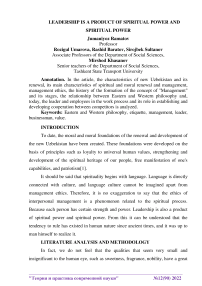Leadership is a product of spiritual power and spiritual power
Автор: Ramatov J., Umarova R., Baratov R., Sultanov S., Khasanov M.
Журнал: Теория и практика современной науки @modern-j
Рубрика: Основной раздел
Статья в выпуске: 12 (90), 2022 года.
Бесплатный доступ
In the article, the characteristics of new Uzbekistan and its renewal, its main characteristics of spiritual and moral renewal and management, management ethics, the history of the formation of the concept of "Management" and its stages, the relationship between Eastern and Western philosophy and, today, the leader and employees in the work process and its role in establishing and developing cooperation between competitors is analyzed.
Eastern and western philosophy, etiquette, management, leader, businessman, value
Короткий адрес: https://sciup.org/140296918
IDR: 140296918
Текст научной статьи Leadership is a product of spiritual power and spiritual power
To date, the moral and moral foundations of the renewal and development of the new Uzbekistan have been created. These foundations were developed on the basis of principles such as loyalty to universal human values, strengthening and development of the spiritual heritage of our people, free manifestation of one's capabilities, and patriotism[1].
It should be said that spirituality begins with language. Language is directly connected with culture, and language culture cannot be imagined apart from management ethics. Therefore, it is no exaggeration to say that the ethics of interpersonal management is a phenomenon related to the spiritual process. Because each person has certain strength and power. Leadership is also a product of spiritual power and spiritual power. From this it can be understood that the tendency to rule has existed in human nature since ancient times, and it was up to man himself to realize it.
Список литературы Leadership is a product of spiritual power and spiritual power
- Ramatov, J. S., & Umarova, R. (2021). Ensuring Human Rights at a New Stage of Uzbekistan's Development. European Journal of Life Safety and Stability (2660-9630), 12, 117-120.
- Раматов, Ж. С., Ҳасанов, М. Н., & Валиев, Л. А. (2022). IX-Х АСРЛАРДА ЎРТА ОСИЁ МУТАФАККИРЛАРИНИНГ АҲЛОҚИЙ ТАРБИЯ ҲАҚИДАГИ ҒОЯЛАРИ (АЛ-ФОРОБИЙ АСАРЛАРИ МИСОЛИДА). Academic research in educational sciences, 3(6), 660-669.
- Baratov, R. (2021). Prospects of Higher Education System (on the Example of Uzbekistan).International Journal on Orange Technologies, 3(3), 128-131.
- Назарова, Н. Ж., Муратова, Д. А., & Жуманиязова, Н. С. (2022). ЎЗБЕКИСТОН ТЕМИР ЙЎЛ ТРАНСПОРТ ТИЗИМИДА АЁЛЛАРНИНГ ЎРНИ ВА РОЛИ. Scientific Impulse, 1(3), 331-336.
- Abdumannapovna, M. D., & Juraevna, N. N. (2022). THE ROLE OF SOCIAL INSTITUTIONS IN THE DEVELOPMENT OF YOUNG PEOPLE. Galaxy International Interdisciplinary Research Journal, 10 (6), 67-70.
- MADALIMOV, T. A. (2021). PROBLEMS OF KNOWLEDGE IN THE VAISHESHIKA DOCTRINE IN ANCIENT INDIA. THEORETICAL & APPLIED SCIENCE Учредители: Теоретическая и прикладная наука, (9), 325-327.
- Baratov, R., & Uzbekova, S. (2022).INTEGRATION OF SCIENCE, EDUCATION AND PRODUCTION IN THE PROCESS OF TRAINING. World scientific research journal, 4(2), 7-11.
- Jumaniyoz Ramatov, Rozigul Umarova, Rashid Baratov, Mirshod Khasanov, Siroj Sultonov, & Fayzulla Kushakov (2022). PROBLEMS OF INFLUENCE OF ISLAM ON CONSCIOUSNESS TRANSFORMATION. Academic research in educational sciences, 3 (10), 591-597.


